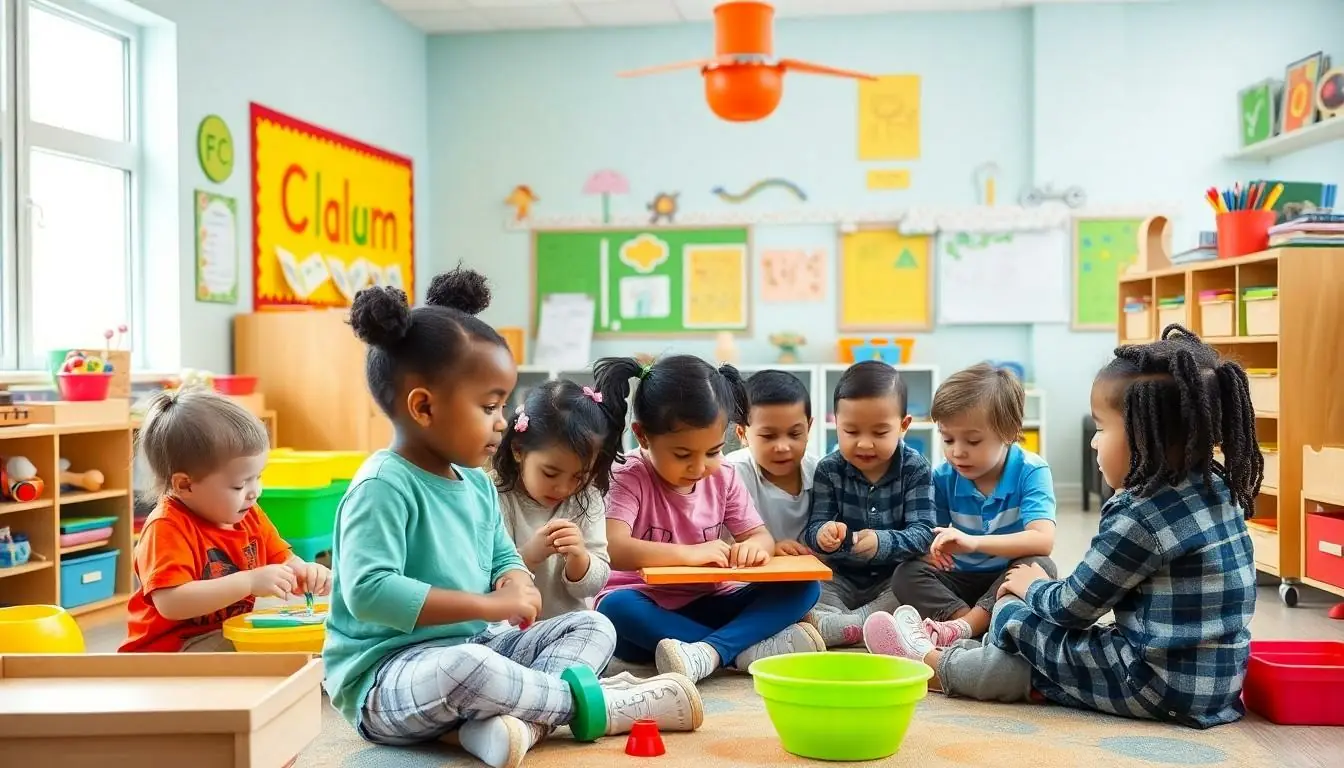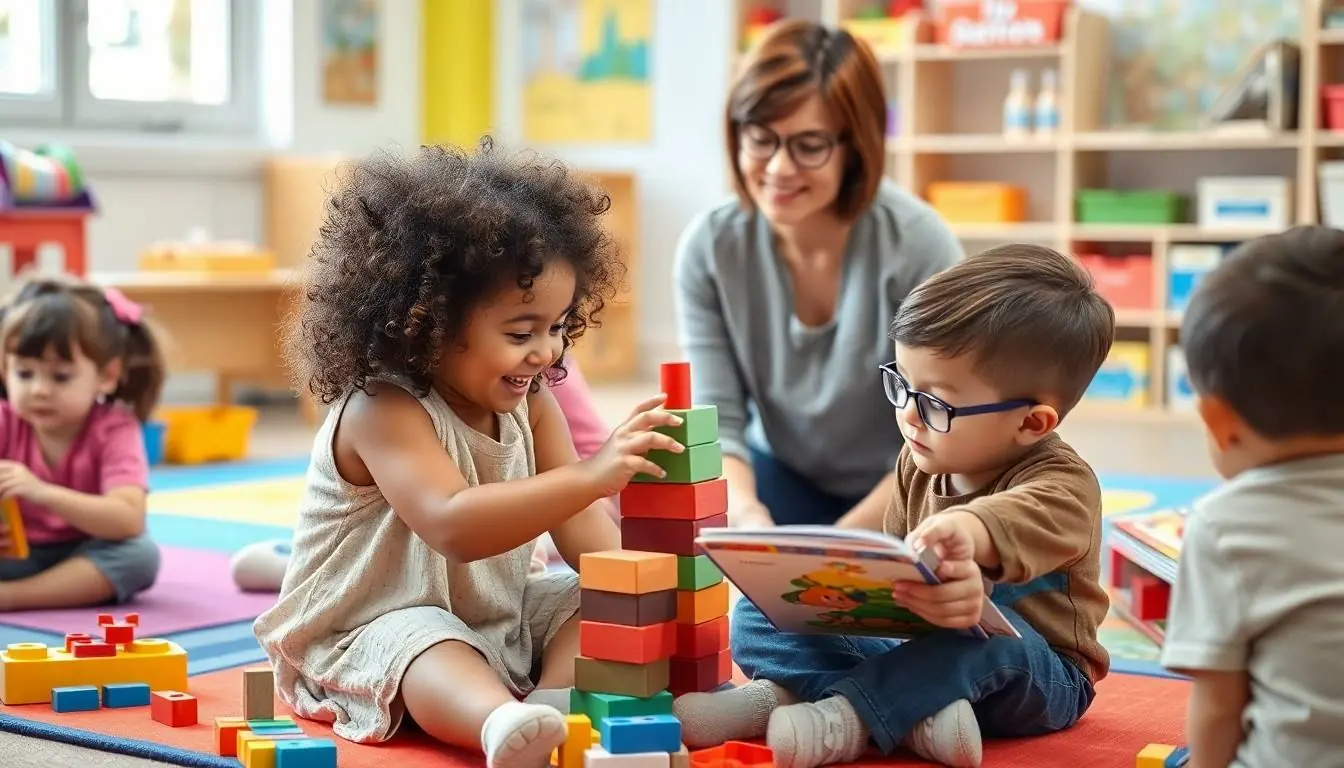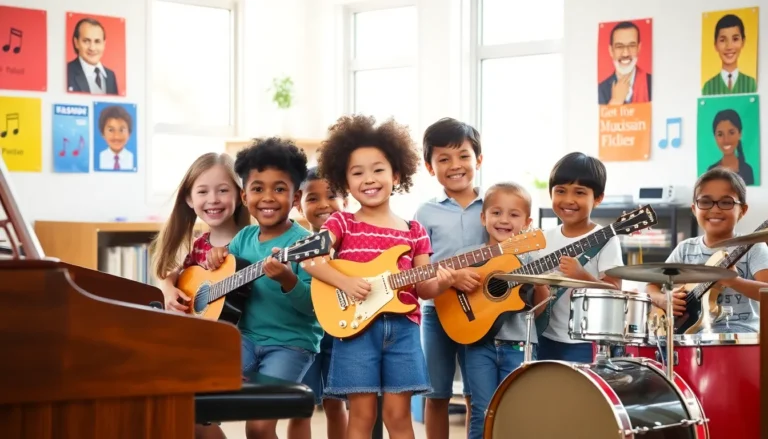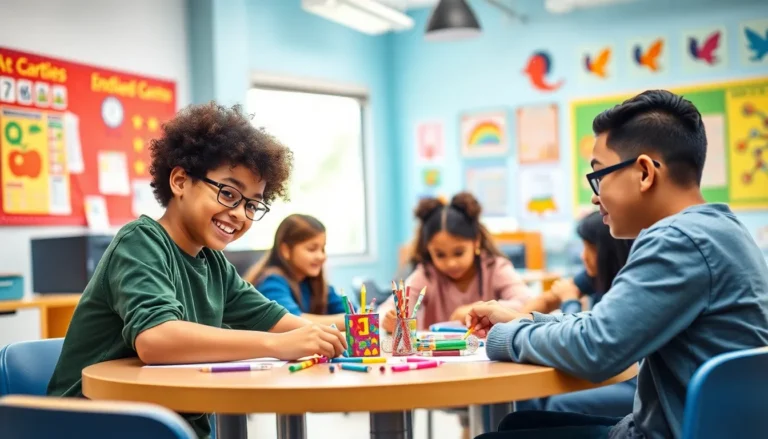In the world of early childhood education, grades might seem like a foreign concept—like trying to teach a cat to fetch. Yet, understanding these grades is crucial for parents navigating the vibrant jungle of preschool and kindergarten. It’s not just about letters and numbers; it’s about laying the foundation for lifelong learning and growth.
Table of Contents
ToggleOverview of Early Childhood Education Grades
Understanding early childhood education grades provides parents with essential insights into their children’s development. Grades reflect not only academic progress but also social and emotional growth.
Definition and Importance
Early childhood education grades encompass assessments for children typically aged 3 to 8. These grades represent academic performance, learning behaviors, social skills, and emotional understanding. They serve as tools for educators and parents to track growth and identify areas needing support. Addressing these evaluations helps foster strong foundational skills necessary for future learning experiences. By recognizing the significance of these grades, parents gain insight into their child’s educational journey and areas for engagement.
Key Milestones in Early Childhood Education
Significant milestones occur in early childhood education, marking crucial points in development. Children typically achieve language acquisition around age 2, showcasing vocabulary expansion. Social skills emerge as they learn to share and interact with peers by age 3 or 4. Cognitive development accelerates around age 5, with children grasping math concepts and problem-solving skills. By age 6, they usually demonstrate reading readiness and can decode simple texts. Acknowledging these milestones enables parents and educators to support children effectively while tailoring learning experiences to meet their evolving needs.
Curriculum and Learning Standards

Curriculum and learning standards play a critical role in shaping early childhood education environments. These guidelines define age-appropriate expectations that help educators structure their teaching methods and strategies.
Age-Appropriate Learning Goals
Learning goals must align with children’s developmental milestones, ensuring they are attainable for young learners. By age 3, social skills such as sharing and turn-taking should be emphasized. As students approach age 5, cognitive abilities involve problem-solving and critical thinking exercises. Language acquisition remains a priority, with educators aiming to enhance vocabulary and comprehension by age 6. Tracking these goals allows teachers and parents to provide targeted support, fostering children’s readiness for future academic challenges.
Examples of Effective Curriculum Models
Structured curriculum models enhance the learning experience for preschool and kindergarten children. The HighScope approach encourages active learning by involving students in hands-on activities. Montessori methods emphasize independence, promoting self-directed exploration and discovery. The Reggio Emilia approach focuses on community and expression, engaging children in collaborative projects. Each model addresses unique needs, contributing to a well-rounded educational framework that supports overall growth and development.
Assessment and Evaluation Methods
Early childhood education emphasizes the importance of assessment in tracking student progress. Understanding different evaluation methods provides parents and educators with insight into children’s development.
Formative vs. Summative Assessments
Formative assessments occur throughout the learning process and aim to inform instruction. Teachers use these assessments to gauge children’s understanding and adjust teaching strategies accordingly. Examples include observations, quizzes, and interactive activities. In contrast, summative assessments evaluate learning at the end of a unit or term. These assessments often take the form of tests or performance tasks, measuring overall achievement. Both types complement each other, offering a comprehensive view of child development and ensuring targeted interventions when needed.
Tools for Measuring Student Progress
Various tools exist for measuring early childhood education progress. Standardized tests assess skills like reading and math, providing benchmarks for educators. Checklists and portfolios allow teachers to document student growth over time, showcasing individual achievements and learning experiences. Observational tools enable educators to track social and emotional development in real-time. Additionally, digital platforms offer interactive assessments that engage students while collecting data. Effective use of these tools ensures a well-rounded assessment strategy, supporting children’s unique learning journeys.
Impact of Early Childhood Education Grades
Early childhood education grades significantly influence a child’s learning trajectory and development. These grades provide essential insights into various aspects of growth and progress.
Benefits on Lifelong Learning
Early childhood education grades foster a solid foundation for lifelong learning. They encourage children to develop essential skills, such as critical thinking and problem-solving. Progress assessments help identify learning styles, allowing educators to tailor their approaches effectively. Engagement in structured learning experiences enhances children’s academic readiness for future grades. Improved communication between teachers and parents supports continued learning outside school. Increased motivation stems from clear goals, inspiring children to pursue further education. Overall, early grades play a crucial role in setting the tone for a student’s future academic journey.
Role in Social and Emotional Development
Grades in early childhood education also impact social and emotional growth. They reflect a child’s ability to interact with peers and develop relationships. Evaluation of social skills assists educators in guiding children’s interactions, fostering cooperation and empathy. Emotional understanding becomes crucial as grades help identify areas where children may need additional support. Children gain confidence through recognition of achievements, promoting self-esteem. Engagement in group activities encourages teamwork and helps to navigate social dynamics. Continuous feedback allows for adjustments in learning environments, ensuring healthy social development.
Understanding early childhood education grades is essential for nurturing a child’s growth. These grades reflect more than just academic performance; they provide insights into social and emotional development as well. By recognizing key milestones and utilizing effective assessment tools, parents and educators can create supportive learning environments tailored to each child’s needs.
The impact of these grades extends beyond the classroom, influencing a child’s confidence and interpersonal skills. As children progress through their early education, the foundation laid during these formative years will shape their future learning experiences. Embracing this knowledge empowers parents and educators to foster a love for learning that lasts a lifetime.





